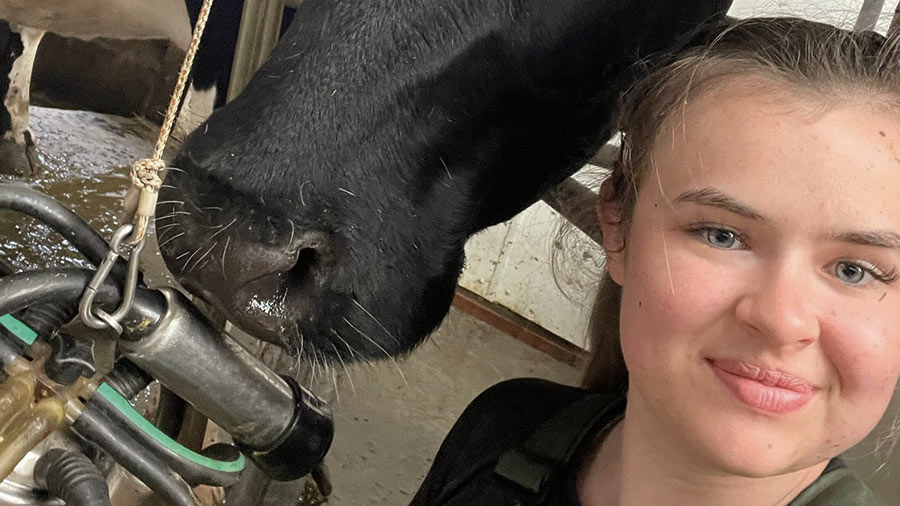Advice on hosting vet students on your dairy farm
 Veterinary student Emma Cossey © Emma Cossey
Veterinary student Emma Cossey © Emma Cossey Sophie and Tom Gregory hosted 15 vet students at Home Farm, Chard, last year and they are already fully booked with student placements for 2023.
The Gregorys calve 360 cows in two blocks, producing organic milk for Arla, and host students during these busy times to benefit from extra pairs of hands.
But the benefits are mutual, with the students offered a broad experience of dairy farming in return.
See also: Why student vets are not going into the industry
Mrs Gregory believes there are a couple of factors that are key to making it successful:
- The attitude of the students “Attitude is everything. I can work with people with a lack of experience, but I can’t really work with people who are just there to tick a box,” she says.
- The attitude of the farm team “You must have the right team to host vet students. It does require a lot of patience and you can’t expect too much of the students initially, but it can really help the team do their job.”
Students are not paid, but a lot of time is invested in them and they leave with skills that can get them well-paid relief milking jobs throughout their university years.
Students are provided with accommodation in a mobile home and offered breakfast in the farmhouse with the rest of the team.
“It is a massive benefit to us as an industry to get more good vets – I see it as part of our role to influence them to come into agriculture,” says Mrs Gregory.
Strict rules for success
The couple began hosting vet students after emailing all the veterinary schools with a farm profile and their contact details for students that were interested.
They have a few strict rules to make it work for everyone – students must:
- Stay for a minimum of two weeks and no more than three – the first week is always spent learning the ropes so there is not much benefit until week two
- Be able to drive, so they are independent when it comes to food shopping because of the rural location
- Stay in groups of two to three so they have company when not working
- Bring their own bedding and clean the accommodation on departure so it does not create extra work at busy times.
Health and safety are important
All students have an induction on day one. This includes a briefing on the farm’s health and safety policy, as well as ensuring everyone has the team’s phone numbers in their mobiles.
Because of insurance, students are not able to drive any farm vehicles or machinery. But Mrs Gregory ensures they experience all aspects of other farm work.
This will include calf feeding, milking, bedding, and helping with routine jobs such as weighing and vaccinating animals and carrying out fresh cow checks and foot trimming.
Students do rotations so they are not always on early morning duties.
“We don’t get them to do night checks because half the time if there is something wrong, they have to come and get us anyway,” she says.
Why it is a valuable experience for students
Emma Cossey, a second-year student at Nottingham University, spent three weeks in total with the Gregorys last year and says the experience was hugely valuable.
“I think so much of building a career as a farm vet is about good connections, and placement is a key part of that. I know that Sophie is always there if I have a question or need a hand finding another placement,” she says.
In her experience, two weeks is a good placement length because, by the end of the first week, you feel like you can start adding value to the farm.
“I think a couple of days shadowing is really useful – the farmer can find it a bit awkward with you following them all day, but it really does help you settle in.
“Then, I think it is important to have some freedom. With good instructions, you can learn so much doing a job on your own and you feel able to help too,” she explains.
Mrs Gregory says she would be happy to give all the students she has hosted a job on the farm.
Although mistakes happen, these are often easy to rectify.
One student did bed up the calves using the muck heap instead of fresh straw on day two of his placement, says Mrs Gregory, but by week two he “blew her out of the water” with his ideas for improving youngstock management.
How to become a placement provider
All vet students must complete extra-mural studies (EMS) throughout their course.
In the first two years of their study, they are required to do 12 weeks of animal handling and husbandry.
Viki Weigh, placements manager for Harper and Keele Veterinary School, explains that requirements are different for all universities. For example, Harper and Keele requires at least one week of cattle handling.
Ms Weigh says that most students source their own placements and then ask farmers to complete a provider form, which enables them to sign up to be on the placement portal for other students to find them.
Any provider must have public liability insurance and can get in touch with the university to ask any questions or reference check the student.
Farmers are asked to complete a digital form to provide feedback on the student’s placement at the end of the period.
Farmers interested in signing up to be a placement provider can email ems@hkvets.ac.uk.
